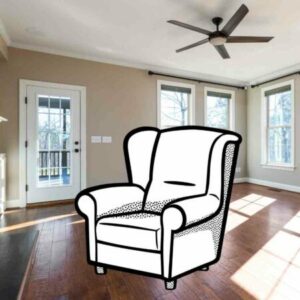 It’s only bad agents who get sued for deceptive real estate photos, right? It’s easy–if you’re honest and never misrepresent anything in your listing photos, how could anyone sue you? You’ll be thrilled to know that there are countless ways to be sued for your listing photos, from unintentional misrepresentation to accidental copyright infringement, as well as for the classic intentional versions of all of these. Even those with immense industry knowledge have to be careful with photography; Zillow recently lost their final appeal in VHT v. Zillow Group, a case involving improper use of real estate photos, and had to pay $2 million to the plaintiff.
It’s only bad agents who get sued for deceptive real estate photos, right? It’s easy–if you’re honest and never misrepresent anything in your listing photos, how could anyone sue you? You’ll be thrilled to know that there are countless ways to be sued for your listing photos, from unintentional misrepresentation to accidental copyright infringement, as well as for the classic intentional versions of all of these. Even those with immense industry knowledge have to be careful with photography; Zillow recently lost their final appeal in VHT v. Zillow Group, a case involving improper use of real estate photos, and had to pay $2 million to the plaintiff.
Many recent real estate photo lawsuits involve copyright violations, as in the case of VHT v. Zillow. The violation often involves photos pulled from Google to illustrate the surrounding neighborhood of a listing. For example, if you want a photo of a specific neighborhood at sunrise, it’s very easy to just type “Williamsburg sunrise” and assume the photos you find are usable without realizing that they are copyrighted images.
Aside from checking copyrights on all images you post, another tactic to avoid listing photo-related lawsuits is to misrepresent so intensely that your misrepresentation is no longer deceptive. I absolutely do not recommend this, but it is a fascinating technique nonetheless. I became aware of this tactic recently, when I saw one of the most deceptive listing photographs I have ever seen for a two-bedroom bungalow in Southeast Portland. This listing photo added a massive imaginary garage to the property (to make this listing more imaginary, I have changed the details of this example because I’m paranoid). The pretend digital garage was very well done, and nowhere did the photo say “digital rendering” or “this photo is super fake” or any other disclaimer. However, this is the type of egregious deception that one can sometimes get away with because it’s so blatant. Anyone interested in the house would tour it and immediately see that there was no garage–the deception here is so absurdly deceptive that it’s hard to argue that it’s actually deceptive. Saying “I bought this property because the photo had a massive garage” makes little sense coming from someone who actually toured the property. Is the lesson here that your deception should be so unbelievably deceptive that it’s not considered deceptive, so like “go big or go home” when it comes to misrepresentation? (Not to destroy the surprise, but the answer is NO, as I will explain later.) This photo became even more deceptive when I asked the real estate agent (who also told me he was the contractor who restored the house) whether building this imaginary garage would be possible, since the garage would have to be built into the ground, as the house was on a slope, and would have to go right up to the edge of the neighboring property. He assured me that the previous owner had “full approval from the city” to build this structure, and that he himself had verified that it would be straightforward to do so. Upon investigating this briefly online, I learned that the previous owner had only achieved preliminary approval for this project, which was preliminary approval to begin considering whether this project could be approved by future approving authorities, subject to a number of further approvals, including a soil study that had not been performed. Additionally, this preliminary approval had expired two years before. Thus, if I were to purchase this house, and ran into any difficulties at all, then I could easily sue this contractor/real estate agent, who gave me not just his opinion as a layperson, but his expert opinion as a professional contractor and real estate licensee.
This photo became even more deceptive when I asked the real estate agent (who also told me he was the contractor who restored the house) whether building this imaginary garage would be possible, since the garage would have to be built into the ground, as the house was on a slope, and would have to go right up to the edge of the neighboring property. He assured me that the previous owner had “full approval from the city” to build this structure, and that he himself had verified that it would be straightforward to do so. Upon investigating this briefly online, I learned that the previous owner had only achieved preliminary approval for this project, which was preliminary approval to begin considering whether this project could be approved by future approving authorities, subject to a number of further approvals, including a soil study that had not been performed. Additionally, this preliminary approval had expired two years before. Thus, if I were to purchase this house, and ran into any difficulties at all, then I could easily sue this contractor/real estate agent, who gave me not just his opinion as a layperson, but his expert opinion as a professional contractor and real estate licensee.
Even if the deception had been only the altered photographs, there are still plenty of ways this extremely obvious misrepresentation could backfire. Imagine if the buyer were an elderly couple with medical problems involving their vision. This couple legitimately assumed the imaginary garage existed, even if they didn’t actually see it when touring the property. Now the agent’s best defense is blaming a sweet old couple with eyesight challenges for the agent’s own dishonesty. In many cases, you could argue that the listing details didn’t say “garage parking.” However, in this specific case, the listing literally said “Parking: Off-street,” which turned out to mean that the seller had temporarily rented two parking spaces from the building across the street for the next year. Thus, the listing details supported the idea that some sort of garage or other permanent off-street parking existed, when it did not.
An out-of-town buyer who never sees the house before purchasing could easily fall victim to this deception, or a large company that buys tons of houses and resells them without a lot of onsite investigation. Both of these types of arms-length customers are also likely to have the resources for good attorneys if you upset them. Misrepresentation in real estate photos seems like it would be simple to avoid, like there would be a clear list of what not to do that you could easily follow. However, it’s usually not the “what” but the “how” that determines misrepresentation; the context matters more than the act itself. Take the common practice of digitally altering a photo to add a fire to a fireplace. If the fireplace is in perfect operating condition, this digital alteration would not likely be considered a misrepresentation (barring any specific local laws). However, adding a fire to a fireplace that is not in working condition would probably be a misrepresentation. Thus, it’s hard to say that adding a fake, digital fire is always a misrepresentation, though it absolutely can be.
Misrepresentation in real estate photos seems like it would be simple to avoid, like there would be a clear list of what not to do that you could easily follow. However, it’s usually not the “what” but the “how” that determines misrepresentation; the context matters more than the act itself. Take the common practice of digitally altering a photo to add a fire to a fireplace. If the fireplace is in perfect operating condition, this digital alteration would not likely be considered a misrepresentation (barring any specific local laws). However, adding a fire to a fireplace that is not in working condition would probably be a misrepresentation. Thus, it’s hard to say that adding a fake, digital fire is always a misrepresentation, though it absolutely can be.
Digital staging is dangerous, because it’s easy to misrepresent even with no intent to do so, especially if you’re just checking the work of a photo editor helping with your listing. It’s common to add a digital couch that looks great in the photos, and if you’re in a hurry, you may not realize that this couch is a 5-part sectional that could never actually fit in the room. If someone bought a condo that looked like it could fit a massive sectional, but it could only fit an armchair, this digital staging could be evidence of misrepresentation.
It’s also easy to think you’re just digitally adding a clear sky to the background to correct for an overcast day, or adding a sun-dappled entryway to a dark part of the photograph. Before you innocently try to become the Monet or Vermeer of digital real estate renderings, make sure that the sun can actually shine through windows in the entryway. If you add a bunch of bright outside light to a foyer that doesn’t have windows, or that never gets light because it’s always in the shade, you could be sued by a disgruntled buyer.
I can hear you thinking “but I’m honest and careful so misrepresentation likely won’t be a problem for me.” You may be right, but something I’ve noticed in life is that it’s not always the most egregiously deceptive person who gets sued; it’s the stressed but perhaps well-intentioned agent who didn’t check their digital staging carefully who gets sued for suggesting that a home’s foyer was dappled with sun, when in fact it is not dappled at all. Remember that even if you’re not editing your own listing photos, you still are responsible for verifying that they are accurate. Imagination and creativity are virtues, but not in real estate listings; a misplaced dapple of sunlight could put you in court.
References:
https://rworld.com/blog/photo
https://www.nar.realtor/magazine/real-estate-news/technology/the-worst-offenses-in-virtually-staged-photos
https://theamericangenius.com/housing-news/real-estate-photography-copyright-issues-persist/#google_vignette
https://theamericangenius.com/housing/board-associations/class-action-lawsuit-alleges-corelogic-mls-products-violate-photographers-copyrights/
https://www.realtrends.com/articles/zillow-to-pay-2-million-for-copyright-infringement/
https://www.johnsonandwilson.com/summervillerealestateblog/554-avoiding-misrepresentation-in-real-estate-photos.html
https://www.realtrends.com/articles/zillow-to-pay-2-million-for-copyright-infringement/
(866) 519-9597



